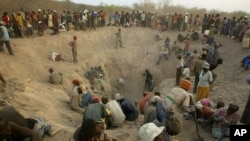International watchdog group Global Witness says powerful political elites and security forces have controlled and secretly exploited Zimbabwe's diamond sector for a decade.
Zimbabwe's dreaded Central Intelligence Organization and the military are among the state actors accused of holding stakes in private diamond enterprises, trading the country's precious stones on the international market.
Global Witness says it examined the workings of five of the major diamond companies in Zimbabwe, and found they have actively worked to conceal their finances and beneficiaries.
"Lots and lots of diamonds' revenue have clearly not ended up in the national budgets," said Global Witness researcher Michael Gibb. "These resources have, unfortunately, ended up inside the security forces and institutions that have long been implicated in undermining Zimbabwe's democracy and [committing] serious human rights abuses."
Government officials declined comment when reached by VOA. Junior Mining Minister Fred Moyo said he could not comment on what he called the "historical part of Zimbabwe's diamond mining."
Zimbabwe discovered the diamond fields in 2006 in the eastern part of the country, Marange, and began mining operations three years later.
Meanwhile, the country's economy has declined. Zimbabwe has no national currency, faces a severe cash shortage and is struggling to pay civil servants.
President Robert Mugabe announced in March 2016 that he was bringing the diamond industry under state control. The president blamed $13 billion in missing diamond revenue on private companies he accused of robbing the nation.
Global Witness said it is a "myth" to blame losses solely on private investors.
"The Marange [diamond] discovery was met with such hope and expectation that it would help the country charge away from [its] difficult economic situation. It is clear that such hope has been dashed," Gibb said. "Reforms should focus less on how [many] companies are operating in Marange, whether one, five or 10. The people of Zimbabwe deserve to know how much companies are making from their diamonds, and where that money is going and how it is being spent."
Spokesman Obert Gutu of Zimbabwe's main opposition party, the Movement for Democratic Change, welcomed the Global Witness report.
"If those diamonds had been properly accounted for, the eastern border of Mutare would be our own Las Vegas of Zimbabwe," he said. "But if you go to Mutare today, it is a ghost town just like any other city in Zimbabwe. Derelict infrastructure. You then ask yourself: Where has all the money gone? Obviously, the money has been externalized and a few people have benefited at the expense of the nation of Zimbabwe."
Mugabe's nationalization of the diamond sector has not gone unchallenged. Court cases by the private companies ordered to stop work in March 2016 are ongoing.
Global Witness says the diamond sector under the control of the new government-backed mining company remains shrouded in secrecy.




